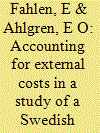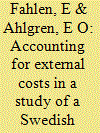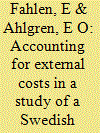| Srl | Item |
| 1 |
ID:
098264


|
|
|
|
|
| Publication |
2010.
|
| Summary/Abstract |
Sweden has historically had strict emission control by implementation of economic policy instruments with the aim of internalising the external costs of air pollution. This study aims to evaluate how well current Swedish policy instruments reflect the environmental costs associated with heat generation in several district-heating (DH) plants in the DH system of Göteborg. Furthermore, it aims to simulate and evaluate the operation of the DH system based on its social cost-effectiveness which takes into account the DH system's private and external costs (non-internalised environmental costs). The study shows that the economic policy instruments do not fully internalise all external costs whereas for certain technologies, the costs in terms of taxes, emission permits, environmental fees, etc. are higher than the environmental costs caused by the pollutants, given the environmental cost estimates used in the study. The simulation results show that the deviating internalisation of external costs affects the economic ranking of the different plants within the studied DH system. The estimated loss in social-cost effectiveness of the operation of the DH system of Göteborg is noticable but relatively small if compared to the variable heat generation costs for most of the studied DH plants.
|
|
|
|
|
|
|
|
|
|
|
|
|
|
|
|
| 2 |
ID:
098560


|
|
|
|
|
| Publication |
2010.
|
| Summary/Abstract |
Sweden has historically had strict emission control by implementation of economic policy instruments with the aim of internalising the external costs of air pollution. This study aims to evaluate how well current Swedish policy instruments reflect the environmental costs associated with heat generation in several district-heating (DH) plants in the DH system of Göteborg. Furthermore, it aims to simulate and evaluate the operation of the DH system based on its social cost-effectiveness which takes into account the DH system's private and external costs (non-internalised environmental costs). The study shows that the economic policy instruments do not fully internalise all external costs whereas for certain technologies, the costs in terms of taxes, emission permits, environmental fees, etc. are higher than the environmental costs caused by the pollutants, given the environmental cost estimates used in the study. The simulation results show that the deviating internalisation of external costs affects the economic ranking of the different plants within the studied DH system. The estimated loss in social-cost effectiveness of the operation of the DH system of Göteborg is noticable but relatively small if compared to the variable heat generation costs for most of the studied DH plants.
|
|
|
|
|
|
|
|
|
|
|
|
|
|
|
|
| 3 |
ID:
098576


|
|
|
|
|
| Publication |
2010.
|
| Summary/Abstract |
Sweden has historically had strict emission control by implementation of economic policy instruments with the aim of internalising the external costs of air pollution. This study aims to evaluate how well current Swedish policy instruments reflect the environmental costs associated with heat generation in several district-heating (DH) plants in the DH system of Göteborg. Furthermore, it aims to simulate and evaluate the operation of the DH system based on its social cost-effectiveness which takes into account the DH system's private and external costs (non-internalised environmental costs). The study shows that the economic policy instruments do not fully internalise all external costs whereas for certain technologies, the costs in terms of taxes, emission permits, environmental fees, etc. are higher than the environmental costs caused by the pollutants, given the environmental cost estimates used in the study. The simulation results show that the deviating internalisation of external costs affects the economic ranking of the different plants within the studied DH system. The estimated loss in social-cost effectiveness of the operation of the DH system of Göteborg is noticable but relatively small if compared to the variable heat generation costs for most of the studied DH plants.
|
|
|
|
|
|
|
|
|
|
|
|
|
|
|
|